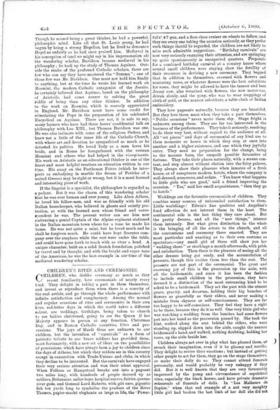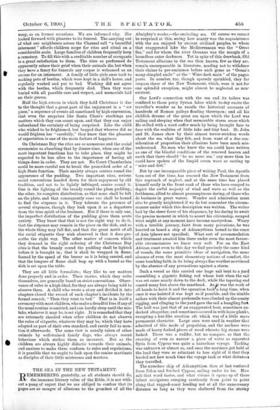• . . CHILDREN'S RITES AND CEREMONIES.
CHILDREN, who dislike ceremony as much as they resent familiarity, love ceremonials of nearly every kind. They delight in taking a part in them themselves and invent or reproduce them when there is a scarcity of the real article, and go through the whole performance with infinite satisfaction and complacency. Among the normal and regular occasions of rites and ceremonies in their own lives, red-letter days in which the world takes a different colour, are weddings, birthdays, being taken to church ta see babies christened, going to see the Queen if her Majesty appears in person at any function, Christmas Day, and in Roman Catholic countries, fetes and pro- cessions. The joys of Mardi Gras are unknown to our children, but the invention of " carnivals " as a form of patriotic tribute to our brave soldiers has provided them, most fortunately, with a new set of ideas on the possibilities of processions, which have always been a joy to children since the days of Athens, but which they seldom see in this country except in connection with Trade-Unions and clubs, in which they decline to be interested. But the carnivals have engaged their very serious attention and won their silent approval. When Pulliam or Hampstead breaks out into a pageant two miles long, with hundreds of people dressed up as soldiers, Britazuzias, sailor-boys, hospital nurses, fairies, queens, river gods, and General Lord Roberts, with gilt cars, gigantic fish ten yards long to symbolise the produce of the River Thames, papier-mache elephants as large as life, the ' Power- furs'. 4-7 gun, and a first-class cruiser on wheels to follow, and they see every one taking the occasion seriously, as they-prefer
such things should be regarded, the children are not likely to miss such admirable suggestions. "Birthday carnivals" are now very seriously engaging their attention, and are springing up quite spontaneously in unexpected quarters. Proposals for a combined birthday carnival at a country house where several small children were staying show the fertility of their resources in devising a new ceremony. They begged that in addition to themselves, crowned with flowers and scattering roses, or whatever flowers were the best substitute for roses, they might be allowed to have the tamest and best Jersey cow, also wreathed with flowers, the new motor-car, driven slowly, and the pony, who was to wear trappings of cloth of gold, or the nearest substitute, a table-cloth of Indian embroidery.
They love pageants naturally, because they are beautiful. But they love them most when they take a part themselves. "Public occasions" never make them shy. Stage fright is unknown among them. They are far too interested in the business of the performance. They take it seriously, resolving to do their very best, without regard to the audience at all. All "set pieces" and days of ceremonial of any kind are to them moments or hours in which they step at once into another and a higher existence, and one which they joyfully enter. They need no preparation for the change, being to the manner born, the unspoilt possible favourites of fortune. They take their places naturally, with a serene con- tent, and step almost without elation into the fairy palaces. They always show their pleasure when inmates of ' a fresh house, or of sumptuous modern hotels, where the company is well-dressed, numerous, and sedate. "You know what happens to little girls who are good," said a friend improving the occasion. "Yes," said her Brasil acquaintance, "then. they go to hotels."
Weddings are the favourite ceremonials of children. They combine many sources of unbounded satisfaction to them. Little worldlings ! Edwin's fine qualities and Angelina's fond affection do not interest them in the least. The sentimental - side is the last thing they care about. But the pretty dresses, and all the "new things," interest them intensely. But what gives distinction to the whole is the bringing of all the actors to the church, and all the conventions and ceremony there enacted. They are most particular and exacting as to their own costume as spectators,—any small girl of three will show you her "wedding shoes" or stockings a month afterwards, with pride and satisfaction. Then there is the pleasure of seeing all the other dresses being got ready, and the accumulation of presents, though this excites them less than the rest. The presents are not part of the ceremonial. The great and crowning joy of this is the procession up the aisle, with all the bridesmaids, and since it has been the fashion to include small children in the procession, they have deemed it a distinction of the most entrancing kind to be asked to be a bridesmaid. They act the part with the utmost grace, gravity, and decorum, holding their big bunches of flowers as gracefully as their elders, and never making a mistake from shyness or self-consciousness. They are far too happy to be self-conscious. They feel they have a right to be there, because they do it so well. One very little girl who was watching a wedding from the benches had some flowers put into her hand as the procession passed by. She took the hint, walked along the seat behind the elders, who were standing up, slipped down into the aisle, caught the nearest bridesmaid's hand, and walked, nothing doubting, holding her roses, up the aisle beside her.
Children always act over in play what has pleased them, or struck their imagination, even if it be gloomy and terrific. They delight to revive their emotions ; hilt instead of getting other people to act for them, they go on the stage themselves, or make their dolly do so. They cannot attend funerals personally, and would probably be very unhappy if they did. But it is well known that they are very favourably impressed by the pomp and circumstance of sepulchral rites, especially the black horses, and have private dramatic rehearsals of funerals of dolls. In Les Malhem-s de Sophie," when that sad example of a not very naughty little girl had broken the last limb of her doll she did not weep, as on former occasions. We are informed why. She looked. forward with pleasure to its funeral. The carrying out of whit our neighbours across the Channel call "a beautiful interment" affords children scope for rites and ritual on a considerable scale. Large families of children frequently keep a cemetery. To fill this with a creditable number of occupants is a great satisfaction to them. The rites so performed do apparently solace their grief when their animals die, but when they have a fancy for funerals any corpse is welcomed as an excuse for an interment. A family of little girls once took to making pets of beetles, which were kept in a dolrs house, and regularly washed and put to bed. Washing did not agree with the beetles, which frequently died. Then they were buried with all possible care and respect, and memorials laid on their graves.
Half the high esteem in which they hold Christmas is due to the thought that a great part of the enjoyment is a "set piece," a sequence of events all sanctioned by high convention, that even the surprises like Santa Claus's stockings are matters which they can count upon, and that they can enjoy beforehand the certainty of being surprised. Like the child who wished to be frightened, but begged that whoever did so would frighten her "carefully," they know that the pleasure of expectation is one of the main factors of happiness.
On Christmas Day the rites are so numerous and the social ceremonies so absorbing that by dinner-time, when one of the most important functions has to take place, they might be expected to be less alive to the importance of having all things done in order. They are not. No Court Chamberlain could be more careful not to break the prescribed order of a high State function. Their anxiety always centres round the appearance of the pudding. Two important rites, serious social conventions handed down for their enjoyment by old tradition, and not to be lightly infringed, centre round it. One is the lighting of the brandy round the plum pudding; the other, its complete distribution, so that none shall be left on the plate, and that consequently some one shall be bound to find the sixpence in it. They tolerate the presence of several sixpences, though they look upon it as a departure from the true spirit of the business. But if there is only one, the imperfect distribution of the pudding gives them acute anxiety. They know that that is not the right way to do it, that the sixpence may remain in the piece on the dish, and so the whole thing may fall flat, and that the great merit of all the social etiquette they wish observed is that it does pre- scribe the right way. The other matter of concern which they demand in the right ordering of the Christmas Day rites is that the brandy round the pudding shall be lighted before it is brought in; that it shall be wrapped in flame, fanned by the speed of the bearer as it is being carried, and that the tongues of flame shall leap up with a bound as the dish is set upon the table.
They are all little formalists; they like to see matters done properly and in order. Their stories, which they write themselves, are generally based on strict conventions. Obser- vance of rules is a high ideal, for they are always being told to observe them. A child who wrote a story and divided it into chapters closed the record of each chapter's incidents by the formal remark, "Then they went to bed." That is in itself a ceremony with most children, who make a dreadful fuss if anyof the usual routine is omitted, and. can hardly sleep until the mis- take, whatever it may be, is set right. It is remarked that they are extremely shocked when other children do not observe the rules of etiquette, whatever they may be, which they have adopted as part of their own standard, and rarely fail to men- tion it afterwards. The same view is usually taken of other animals by well-trained family dogs, who always resent behaviour which strikes them as incorrect. But as the children are always highly didactic towards their animals, and anxious to make them conform to rules and regulations, it is possible that we ought to look upon the canine martinets as disciples of their little mistresses and masters.



















































 Previous page
Previous page